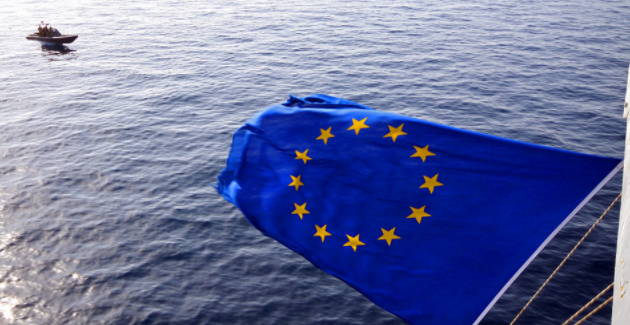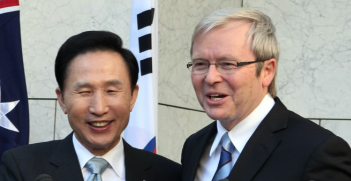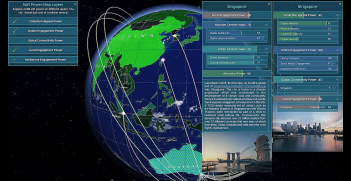Australia-EU Cooperation on Security, Foreign Policy and Development

After years of benign neglect, Europe is re-emerging with a higher priority in Australian thinking on security, foreign policy and development.
The change has been driven by several factors. First there is the reluctant realisation that Australia has become unhealthily dependent on the Chinese economy and that a strategy of diversification is needed. Second, the decision to select a French design for Australia’s new submarine fleet creates a strong imperative to build a closer strategic relationship with Paris. Third, the Australian Defence Force has worked closely with NATO counterparts for well over a decade in Afghanistan, and with the EU and others on counter-piracy and maritime security in the Arabian Gulf and Horn of Africa regions. As an ‘enhanced partner’ of NATO, Australia has built close military ties and could expand these beyond the Afghanistan theatre.
Canberra also realises that Britain’s exit from the EU means that more Australian effort is needed on the European continent itself to strengthen ties. If it ever was a sensible conduit to Europe for Australia, London can’t convincingly play that role after Brexit. Australia and Europe also face shared threats that are not limited by geography and are increasingly high priority. Cooperation on counter terrorism and on cyber security draws key intelligence and security agencies closer together.
Finally, it should be said that some key figures in government—Malcolm Turnbull, Julie Bishop and Mathias Cormann in particular—have deep interests in closer European engagement. Cormann, for example, worked hard to establish an Australia-Germany Advisory Group enabling Canberra and Berlin to substantially strengthen ties.
Taken together these factors create an opportunity to intensify Australia’s engagement with European countries and the EU as an institution. While this is a positive thing, enhanced cooperation will only be sustained by practical forms of cooperation that deliver real benefits to both Australia and EU countries. Opportunities can fail to be acted on and Canberra, Brussels and the European capitals all suffer from resource constraints. Delivering a step change in Australia-EU cooperation on security, foreign policy and development will require carefully considered and well-targeted practical policy measures, backed up with a focus on implementation.
In terms of security cooperation there is a lengthy list of areas where closer engagement between Australia and EU countries is already happening and likely to grow further. Sadly, there will continue to be a need to work more closely on counter-terrorism and in developing counter-radicalisation strategies.
No country has a monopoly on how to do this effectively and there is a real urgency to intensify intelligence cooperation and data-sharing by bringing police forces and other security agencies together. Likewise, the need for closer collaboration on cyber security will continue to grow. Protection of cyber systems is an essential enabler for business, military and science and technology collaboration.
Industry collaboration will drive closer defence cooperation. The next Australian submarine—12 are to be constructed over a 20-year period—headlines a growing list of Australian-European military acquisitions. The days of simply exporting defence equipment are long gone. Large defence projects today are elaborate joint ventures that will hopefully create shared opportunities to do business in Asia and elsewhere. A cautionary note is needed: Australia has had a few unhappy experiences in the past with European defence industry collaboration. The submarine project simply must be made to succeed or else it will damage broader Australia-Europe industrial collaboration for years.
Distance will always impose limits on practical military-to-military cooperation, but some of this needs to happen if we are to sustain a genuinely closer Australia-EU relationship. Canberra should look for opportunities to second military and intelligence personnel to counterpart agencies in EU countries. It is more than likely our armed forces will cooperate together in Afghanistan and in other theatres for years to come. Where possible, we need to promote deeper interoperability for our defence plans and systems so that our military forces will work together more effectively.
A new Australian foreign policy white paper due later this year will hopefully sustain the momentum in closer collaboration with Europe. We should consciously look for opportunities to do more together to promote shared values and interests. Europe and Australia are strong proponents of the international rule of law, a concept which is under sustained challenge from Russia and China and was recently dismissed by the Russian Foreign Minister Sergey Lavrov as “an instrument for ensuring the growth of an elite club of countries and its domination over everyone else. It is clear that such a system could not last forever.”
In the face of such illiberal challenges to the world order, Australia and the EU should look to more actively promote the international rule of law through diplomacy and development assistance designed to strengthen such capabilities among partner countries. This might include such activities as joint Australia-EU peacekeeping and stabilisation missions; closer alignment of development assistance projects; joint work to enhance the cybersecurity of developing countries; and partnering on the best way to build military training ties with developing countries.
There have been some impressive developments in the last few years to strengthen Australia and EU cooperation on security, foreign policy and defence. In many respects our alignment is natural given our shared values and similar strategic perspectives. There is no doubt that further cooperation would yield practical benefit. International partnerships work best when their members maintain high expectations of what each will deliver. It’s up to Australian and European governments, institutions and civil society to set some stretch targets for new forms of cooperation.
Peter Jennings PSM is the executive director of the Australian Strategic Policy Institute. He is a member of the Multi- Stakeholder Steering Committee of the EU-Australia Leadership Forum.
This article originally appeared in The EU and Australia: Shared Opportunities and Common Challenges, published on the occasion of the inaugural EU-Australia Senior and Emerging Leaders’ Forums in Sydney on 2–6 June 2017. The AIIA is part of the international consortium selected to deliver the EU-Australia Leadership Forum project, a three-year initiative funded by the EU.





